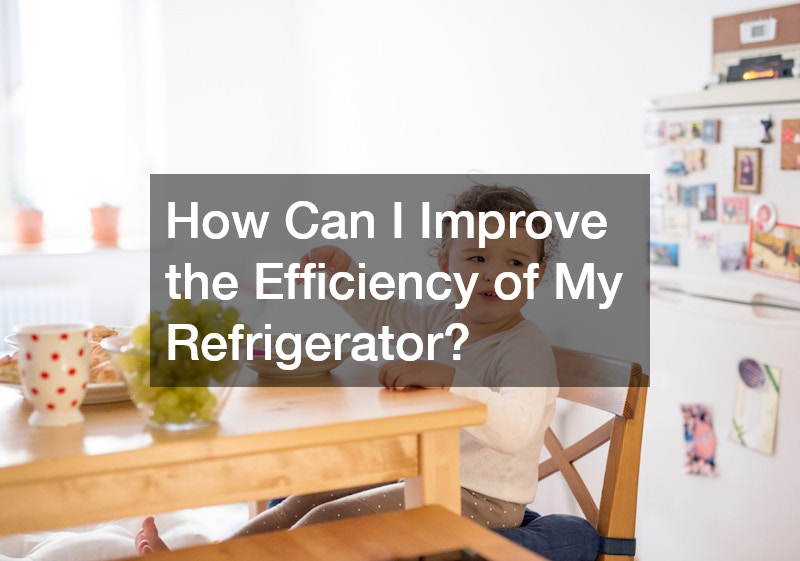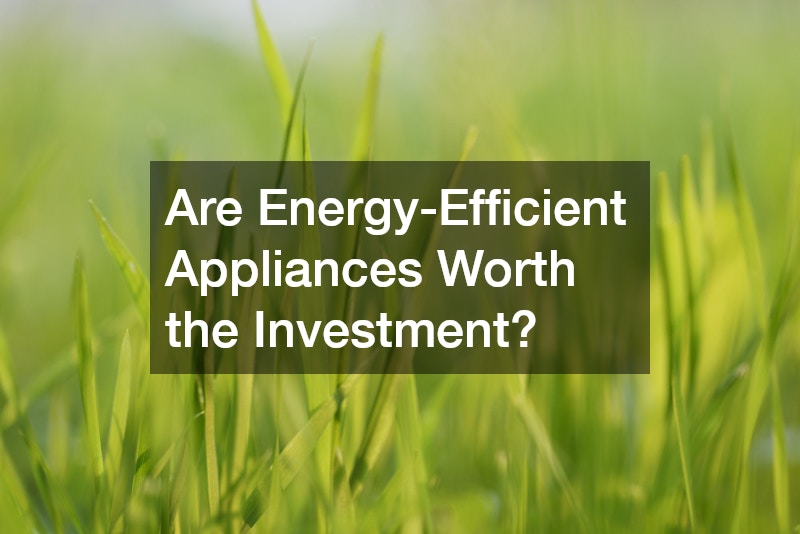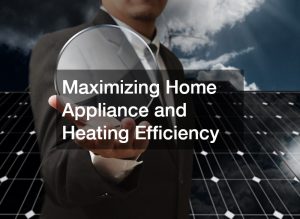How Can I Improve the Efficiency of My Refrigerator?

Monitor Temperature Settings
Keeping your refrigerator and freezer at optimal temperature settings is essential for energy efficiency. The ideal temperature for a refrigerator is around 37°F, while freezers perform best at 0°F. Overcooling wastes energy without offering any additional preservation benefits. Periodically checking and adjusting settings can ensure that the appliance isn’t working harder than necessary.
Ensure Proper Placement and Ventilation
Location significantly impacts a refrigerator’s energy usage. Placing the unit away from heat sources like ovens or direct sunlight reduces the workload on the compressor. Ensuring there’s enough space around the unit, particularly behind it, promotes proper air circulation and reduces energy strain. Proper ventilation also contributes to better indoor climate control by minimizing unnecessary heat generation.
Regularly Clean Coils and Seals
Dust and debris buildup on condenser coils makes your refrigerator less efficient. Cleaning these coils at least twice a year can significantly improve performance. Additionally, ensuring that door seals are intact prevents cold air from escaping, which helps maintain steady internal temperatures and reduces energy consumption.
Manage Door Opening and Storage Strategies
Frequent door openings allow cold air to escape, making the appliance work harder. Try to limit how often and how long you open the fridge or freezer doors. Efficient storage also plays a role—overcrowding impedes air circulation, while an organized layout allows you to find items quickly, reducing open-door time.
Consider Energy-Efficient Models
Older refrigerators can be significant energy hogs. If your unit is more than 10 years old, replacing it with an Energy Star-rated appliance could result in noticeable energy savings. These newer models are designed with efficiency in mind and may also integrate with smart home systems for better energy tracking.
What Are the Best Practices for Heating Efficiency?
Seal and Insulate Your Home
One of the most effective ways to improve heating efficiency is to ensure that your home is properly sealed and insulated. Drafty windows and poorly insulated walls allow heat to escape. Installing impact windows and applying high-quality insulation in walls, attics, and basements can retain warmth, improving your home’s overall thermal performance.
Schedule Regular HVAC Maintenance
Routine maintenance of your HVAC system is essential for keeping it running efficiently. A professional air quality service can assess your system’s performance, clean air ducts, and replace filters to enhance both efficiency and indoor air quality. This is especially important in homes with older heating systems that may require more attention to maintain peak performance.
Optimize Thermostat Use
Smart thermostat settings can dramatically reduce energy consumption. Lowering the temperature when no one is home or during sleep hours conserves energy without compromising comfort. Smart thermostats can learn your habits over time, optimizing climate control with minimal manual input.
Use Zoned Heating Systems
Zoned heating allows you to heat only the areas you use, rather than the entire house. This targeted approach not only conserves energy but also provides better comfort control for individual spaces. Combining this with smart thermostats can significantly enhance heating efficiency and lower your utility bills.
Consider Energy Source Alternatives
Traditional heating systems often rely on fossil fuels, which can be both expensive and inefficient. Heat pumps offer a more energy-efficient alternative, as they move heat rather than generating it, working well for both heating and cooling. Integrating these with home solar panels further reduces dependence on grid energy and lowers long-term costs.
Are Energy-Efficient Appliances Worth the Investment?

Understanding Energy Star Ratings
Energy Star ratings provide a standardized measure for appliance efficiency. Appliances with this certification consume less energy than standard models without sacrificing performance. Whether it’s a washing machine, dishwasher, or air conditioner, choosing Energy Star-rated appliances is a smart investment in long-term savings.
Cost vs. Long-Term Savings
While energy-efficient appliances often come with a higher upfront cost, they pay for themselves over time through reduced energy bills. This cost-benefit balance becomes even more attractive when you consider potential rebates and incentives offered for sustainable upgrades like home solar panels or energy-efficient HVAC systems.
Impact on Utility Bills
Switching to energy-efficient appliances can result in a noticeable drop in monthly utility expenses. When paired with technologies like smart meters and usage tracking apps, homeowners can closely monitor consumption and make informed adjustments to further enhance savings.
Environmental Benefits
Energy-efficient appliances consume less power, reducing greenhouse gas emissions. When combined with other eco-friendly upgrades such as impact windows and renewable energy solutions, homeowners can substantially reduce their carbon footprint and contribute to a healthier planet.
Resale Value Considerations
Homes equipped with modern, energy-efficient appliances and systems tend to attract more buyers and command higher resale prices. Features like Heat pumps, smart climate control systems, and even installed EV charger stations are increasingly appealing to eco-conscious consumers looking for long-term savings.
How Do Smart Thermostats Enhance Heating Efficiency?
Learning Your Schedule
Smart thermostats can learn your daily routines and automatically adjust temperatures for maximum efficiency. This eliminates the guesswork and helps maintain consistent climate control without unnecessary heating when no one is home.
Remote Control and Automation
With mobile apps, homeowners can remotely manage their heating and cooling systems. This is especially useful for unexpected schedule changes, ensuring your home is always at the right temperature without wasted energy.
Energy Consumption Insights
Smart thermostats provide detailed insights into your heating and cooling usage patterns. These analytics can help you understand where energy is being wasted and what changes can improve efficiency.
Integrating with Other Smart Devices
Modern smart thermostats often integrate with other smart home devices, including lighting, window blinds, and security systems. Automated coordination between these systems enhances overall energy efficiency by adapting to occupancy and daylight availability.
Cost and Efficiency Analysis
Smart thermostats help reduce heating and cooling costs by automatically optimizing performance based on your usage and local weather conditions. When combined with other technologies like Heat pumps or zoned systems, they can drastically improve overall system efficiency.
What Role Does Appliance Maintenance Play in Efficiency?

Importance of Regular Check-ups
Regular inspections and servicing of home appliances can identify small issues before they turn into costly repairs. This proactive approach not only extends the lifespan of your appliances but also keeps them running at peak efficiency.
Cleaning and Replacing Filters
Many home systems, especially those related to HVAC and air purification, rely on clean filters to function efficiently. Dirty or clogged filters force systems to work harder, increasing energy use and reducing air quality. A professional air quality service can ensure filters are replaced on schedule.
Upgrading Outdated Parts
Old or malfunctioning parts can drastically reduce an appliance’s efficiency. Certified electricians and residential electricians can help replace inefficient components in HVAC units, water heaters, and other critical systems, ensuring your home operates at optimal performance.
Detecting and Fixing Leaks
Leaks in appliances such as dishwashers, refrigerators, or HVAC ductwork can lead to significant energy waste. Regular inspections by trained technicians can help identify and repair these issues quickly.
Keeping User Manuals Handy
User manuals contain valuable information about optimal operating procedures, troubleshooting, and maintenance schedules. Referring to them can prevent common issues and ensure that you’re using your appliances as efficiently as possible.
What Should I Consider When Upgrading My Heating System?
Understanding System Types
There are several types of heating systems, from furnaces and boilers to ductless mini-splits and Heat pumps. Understanding the pros and cons of each can help you choose the system that best fits your home’s needs and climate.
Assessing Home Size and Insulation
The size of your home and the quality of its insulation affect the type and capacity of heating system you’ll need. For instance, homes with impact windows and proper insulation require less energy to maintain a comfortable temperature, allowing for smaller and more efficient systems.
Calculating Return on Investment
Though new heating systems may require a sizable initial investment, the long-term energy savings often justify the cost. Factors like decreased utility bills, fewer repairs, and increased home value all contribute to the return on investment.
Evaluating Energy Source Options
When upgrading your heating system, it’s worth considering alternatives like home solar panels or Heat pumps that rely on electricity rather than fossil fuels. These solutions reduce dependence on external energy providers and offer long-term sustainability.
Professional Consultation Importance
Consulting with certified electricians or HVAC professionals ensures that your heating system is properly sized, installed, and optimized. Professional insight also helps with tasks like EV charger installation or integrating your heating system with home automation platforms.
How Does Appliance Usage Impact Efficiency?
Timing and Energy Rates
Many energy providers offer lower rates during off-peak hours. Running energy-intensive appliances like dishwashers or washing machines during these times can result in substantial cost savings.
Minimizing Standby Power Use
Even when turned off, appliances often draw small amounts of power. Using power strips or smart outlets to cut off standby electricity can improve overall energy efficiency.
Sequencing Usage for Maximum Efficiency
Using appliances sequentially rather than simultaneously can reduce demand on your home’s electrical system and avoid unnecessary spikes in energy consumption.
Grouping Tasks to Reduce Use
Planning your activities—like cooking several meals at once or doing laundry in larger loads—can reduce the frequency and duration of appliance use, saving energy in the process.
Leveraging Power Saver Modes
Many modern appliances come with power-saving modes designed to use less electricity. Enabling these features can make a significant difference in monthly energy consumption.
What Are the Benefits of Energy Audits?
Identifying Energy Drains
An energy audit provides a detailed analysis of where your home is losing energy. This might include drafty windows, underperforming appliances, or insufficient insulation.
Prioritizing Improvement Areas
With a clear understanding of problem areas, you can prioritize the most impactful improvements, such as upgrading to Heat pumps, installing home solar panels, or replacing old appliances.
Investment in Efficiency Upgrades
Energy audits often come with recommendations that offer the highest return on investment. Whether it’s adding insulation, sealing ducts, or upgrading climate control systems, these improvements can lead to substantial savings.
Understanding Audit Processes
A comprehensive audit includes everything from blower door tests to infrared thermography. Understanding these processes ensures that you know what to expect and how to act on the results.
Partnering with Energy Consultants
Professional energy consultants can help you interpret audit results and recommend tailored solutions. They also work with certified electricians and residential electricians to implement the necessary upgrades, including EV charger installation and smart home integrations.
What Innovations Are Emerging in Appliance Efficiency?
Cutting-Edge Energy-Saving Technologies
Appliances now feature advanced technologies like inverter motors, variable-speed compressors, and smart diagnostics that adjust operation based on load and usage patterns for better efficiency.
Integration with Renewable Energy Sources
Modern appliances are increasingly designed to operate in harmony with renewable energy sources like home solar panels, enhancing both efficiency and sustainability.
Improvements in Manufacturing
Manufacturers are focusing on eco-friendly materials and production methods, reducing the overall environmental impact of appliance production and operation.
Smart Home Ecosystems
Integration of appliances with broader smart home ecosystems—linking thermostats, lighting, window blinds, and security systems—optimizes energy usage throughout the day.
Industry Trends and Future Outlook
Expect continued innovation in energy-efficient technologies, driven by stricter regulations and consumer demand for sustainable products. Appliances will become more adaptive, intelligent, and aligned with smart grid systems.
How Can I Track and Control My Home’s Energy Use?

Installing Smart Meters
Smart meters provide real-time data on your home’s electricity usage, helping you understand consumption patterns and identify areas for improvement.
Utilizing Energy Management Systems
Advanced energy management systems allow you to control, schedule, and automate energy use across various devices and systems in your home.
Analyzing Usage Patterns
Detailed analytics provided by smart meters and apps help you pinpoint inefficient practices and adjust your habits accordingly.
Setting Energy Budget Alerts
Many systems allow you to set usage thresholds and receive alerts when you’re nearing your limit, helping you stay within budget.
Employing Mobile Applications
Mobile apps make it easy to manage energy use on the go, allowing you to control thermostats, lighting, and other appliances remotely.
Closing Thoughts
Maximizing the efficiency of your home appliances and heating systems is a smart way to reduce costs, enhance comfort, and contribute to a more sustainable future. From upgrading to energy-efficient appliances and using Heat pumps to integrating smart climate control and scheduling regular air quality service, there are many strategies available. Leveraging the expertise of certified electricians and residential electricians can further ensure your systems are optimized and safely installed. Adding enhancements like home solar panels, impact windows, and EV charger installation not only boosts efficiency but also increases the value and appeal of your home. By making informed decisions and embracing modern innovations, you can transform your household into an energy-efficient, future-ready environment.



